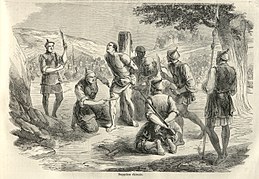
Back لينغتشي Arabic Линчи Bulgarian Ling-čch’ Czech Lingchi German Muerte por mil cortes Spanish لینگچی Persian Tuhannen sivalluksen kuolema Finnish Lingchi French Lingchi Irish Լինչի Armenian

| Lingchi | |||||||||||||||||||||||
|---|---|---|---|---|---|---|---|---|---|---|---|---|---|---|---|---|---|---|---|---|---|---|---|
| Chinese name | |||||||||||||||||||||||
| Traditional Chinese | 凌遲 | ||||||||||||||||||||||
| Simplified Chinese | 凌迟 | ||||||||||||||||||||||
| |||||||||||||||||||||||
| Vietnamese name | |||||||||||||||||||||||
| Vietnamese alphabet | tùng xẻo lăng trì | ||||||||||||||||||||||
| Hán-Nôm | 丛刟 凌遲 | ||||||||||||||||||||||
Lingchi (IPA: lǐŋ.ʈʂʰɨ̌, Chinese: 凌遲), usually translated "slow slicing" or "death by a thousand cuts", was a form of torture and execution used in China from around the 10th century until the early 20th century. It was also used in Vietnam and Korea. In this form of execution, a knife was used to methodically remove portions of the body over an extended period of time, eventually resulting in death. Lingchi was reserved for crimes viewed as especially heinous, such as treason. Even after the practice was outlawed, the concept itself has still appeared across many types of media.
© MMXXIII Rich X Search. We shall prevail. All rights reserved. Rich X Search